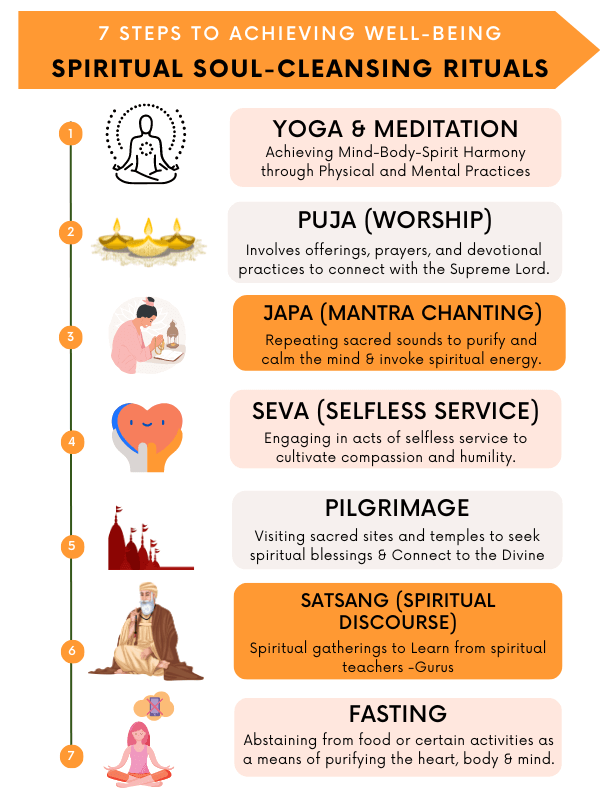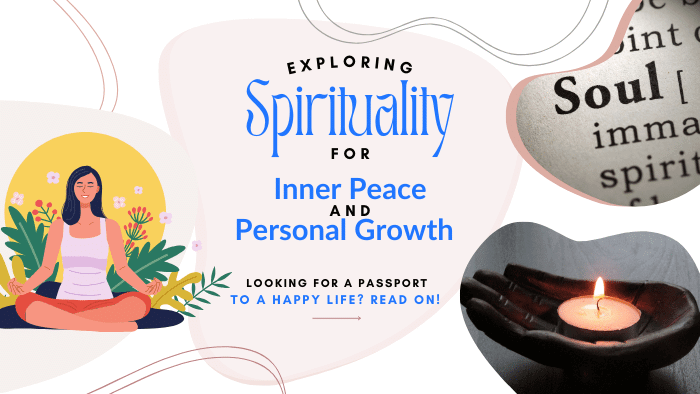Table of Contents
Key Insights You Shouldn’t Miss
- Are you feeling a bit lost or looking for a deeper purpose in life? Then understanding spirituality is just what you need!
- Whether you’re religious or not, exploring spirituality can bring about a sense of inner peace and personal growth.
- Read this article if you want to find deeper meaning in life and feel a connection to something greater than yourself for your eternal well-being.
Spiritual wisdom can play a big role in helping our mental health and overall well-being. It’s about finding peace and comfort during tough times and connecting with something greater than ourselves.
You’ll learn how spirituality is not just about religion. This article about what does spirituality mean will explore how adding spiritual activities to our daily routine can boost our well-being, with a focus on the potential of Ancient Wisdom from Sanatan Dharma, the Eternal Way of Life to provide solace.
So get ready to dive into the world of spirituality and discover the profound benefits it can bring!
What does spirituality mean?
Definition of Spirituality?
A state of being that recognizes and follows soul’s connection to Higher Powers. This Consciousness is our true spiritual nature, the highest intellect
Spirituality is about finding true meaning in life. It’s like trying to connect with something bigger than yourself, through religion, nature, or art.
Origins of the Term “Spirituality”
The term “spirituality” has its roots in the Latin word “spiritus,” which means soul or spirit. It has been a significant aspect of Hinduism for centuries, influencing people’s beliefs and practices.
Modern spirituality often refers to a deep connection with something greater than oneself, encompassing spiritual practices, a search for meaning in life and a sense of purpose beyond material possessions.
Historical and Cultural Influences on the Concept
Throughout history, Hinduism and other religions have shaped the spiritual experience of people for centuries. Spirituality is deeply embedded in practices such as meditation and mindfulness, emphasizing inner peace and enlightenment.
These practices offer a profound experience and have been passed down through the centuries.
Exploring Benefits of Spirituality?
Have you ever wondered what does spirituality mean for overall well-being, let’s discover its benefits.
- Finding Inner Peace and Purpose -Through engaging in spiritual activities like meditation, prayer, and mindfulness, people can access a feeling of inner peace and joy.
- Personal Growth and Self-Discovery – Through self-questioning, observation, and thinking, individuals gain insights into their values, beliefs, and desires. Leading to personal growth.
- Deeper Connection with Oneself – When we embrace spirituality, we embark on a journey inward – connecting with our innermost being. This connection helps us understand our thoughts and emotions better while gaining clarity about our purpose in life.
- Improved Relationships and Increased Empathy – As individuals explore deeper into their spiritual journey, they develop qualities like empathy, compassion, forgiveness, and acceptance.
- Enhanced Mental Health – Research has shown that embracing spirituality can enhance mental health by offering a source of comfort and strength during difficult circumstances. Individuals who incorporate spiritual practices into their daily lives often report experiencing reduced stress levels and enhanced emotional resilience.
- Better Overall Health Outcome – In terms of physical health, studies have indicated that regular participation in spiritual activities could potentially contribute to longevity and improved immune system function.
- Foster a sense of Community and Social Support – Believers with similar beliefs and values form a strong community. This helps them support each other and grow through shared experiences and spiritual practice.
5 Powerful Insights about Spirituality
Let’s delve into the insights from Sanatan Dharma, the true eternal way of life, also known as Hinduism, to gain a better understanding.
Insight 1: Connecting with the Divine
Spirituality is a way of thinking, and living with a sense of connection to something greater than oneself, whatever one perceives it to be, a higher power, God, nature, or the universe.
It is an individual journey that goes beyond religious boundaries and rituals. Spiritual practices enable us to tap into our inner selves and establish a profound connection with something greater than ourselves.
Insight 2: Seeking Inner Transformation
Being spiritual involves seeking inner transformation and growth. It is about recognizing our flaws, working on them, and striving to become better versions of ourselves.
This journey requires self-reflection, introspection, and a willingness to let go of negative patterns or habits that hinder personal growth. Spirituality is like your guide to finding your true spiritual self, making every day extraordinary.
A personal endeavour that helps you reduce stress and anxiety, enhance resilience, promote self-acceptance and forgiveness, and foster a greater sense of well-being.
Insight 3: Embracing Universal Love & Compassion
Spiritual people understand the importance of love and compassion towards all beings. They recognize that we are all interconnected and share a common humanity.
By cultivating empathy, kindness, and forgiveness, they strive to create a more harmonious world filled with love rather than hatred.
Insight 4: Practicing Mindfulness and Presence
A key aspect of spirituality is being present in the moment through mindfulness practices. By grounding themselves in the present moment, spiritual individuals can fully experience life’s joys and navigate its challenges with clarity.
Mindfulness allows them to appreciate the beauty around them while staying centred amidst the chaos.
Insight 5: Embracing Higher Consciousness
Spirituality involves expanding one’s consciousness beyond the material world. Overcoming ego-driven desires and attachments to reach higher states of awareness.
Through meditation, contemplation, and spiritual practices, individuals can tap into their inner wisdom and experience a deeper sense of purpose and fulfilment.
Whether one finds solace in nature, meditation, or acts of kindness, spirituality offers a path to self-discovery and growth.
Discovering Various Forms of Spirituality within Sanatan Dharma
Sanatan Dharma, also known as Hinduism, the eternal way of life, offers a rich tapestry of spiritual paths for individuals to embark upon. It’s about trying to connect with your spiritual side and understand your true self beyond just the physical stuff.
This spiritual tradition emphasizes the interconnectedness of all living beings and the divine presence within each individual.
In Sanatan Dharma, there are many beliefs and practices for spirituality. Knowing about these can help people find a spiritual practice they like. What does spirituality mean is the starting point of this path.
Let’s discover the various form to practice spirituality:
Bhakti: The Path of Loving Devotion to the Divine
Bhakti is a type of spirituality that emphasizes devotion and love towards the divine. It involves cultivating a deep sense of love and surrender towards a chosen deity or form of God. Followers of Bhakti Yoga throughout history have experienced an intimate connection with the divine and achieved spiritual liberation.
Key Points:
- Bhakti encourages practices such as chanting prayers or mantras, singing hymns, and kirtans, performing rituals, and engaging in acts of service.
- It fosters an emotional bond between the individual and their chosen deity.
- Devotees often seek solace, guidance, and support from their deity through prayer and worship.

Karma: The Path of Selfless Action
Karma is another type of spirituality that focuses on the concept of action. According to this path, one’s actions determine their destiny and ultimate liberation. Karma teaches that every action has consequences, whether positive or negative. Always ask yourself what does spirituality mean as this will guide you.
Key Points:
- Practitioners strive to perform selfless actions without attachment to outcomes.
- The emphasis is on fulfilling one’s duties (dharma) while remaining detached from the fruits of those actions.
- By practising good deeds and living a righteous life, individuals can purify their karma and progress spiritually.
Jnana: The Path of Knowledge
Jnana is a type of spirituality that places great importance on acquiring spiritual knowledge and understanding. It involves seeking wisdom through study, contemplation, self-inquiry, and reflection upon the nature of reality. The goal of Jnana is to understand what does spirituality mean, attain self-realization and recognize one’s true divine nature.
Key Points:
- Followers of Jnana engage in philosophical discussions, study sacred texts such as the Vedas and Upanishads, and seek guidance from enlightened teachers.
- This path encourages individuals to question their assumptions, beliefs, and perceptions about themselves and the world.
- Through deep introspection and self-inquiry, practitioners can transcend their limited egoic identities and realize their oneness with the divine.
Yoga: The Path of Meditation
Yoga is a holistic spiritual practice that includes physical postures (asanas), breath control (pranayama), meditation (dhyana), and ethical principles. In Hinduism, yoga is considered a means to connect with the divine and attain spiritual enlightenment.
Spirituality goes beyond physical exercises; it involves bringing together the body, mind, and spirit in a powerful union. This is the true answer to the question we all have what does spirituality mean.
Cultivating Spirituality – How to practice Spirituality
Engaging in spiritual practices is a powerful way to cultivate spirituality, understand what does spirituality mean and deepen our connection with the inner self and the world around us.
We will help you explore some of the most helpful spiritual practices that can enhance your spiritual well-being:
1) Meditation: Looking Inward for Spiritual Growth
In Sanatan Dharma, spirituality focuses on looking inside and understanding yourself. People are encouraged to think deeply about their thoughts, feelings, and actions.
By meditating and asking themselves questions, they try to learn more about who they are and how they fit into the world.
Gratitude practices – are an essential component of meditation. When we take the time to reflect on the things we are grateful for, it can help us cultivate a more positive mindset and shift our focus away from negativity.
This inward reflection can lead to spiritual growth as we become more attuned to the blessings in our lives and develop a deeper sense of appreciation for the world around us.
Mindfulness Meditation – helps individuals cultivate a sense of awareness and presence in the present moment. By focusing on the breath and observing the thoughts and emotions that arise without judgment, individuals can gain a deeper understanding of themselves and their connection to the world around them.
2) Prayer: Connection with the Supreme Lord for Love & Guidance
Prayer is a strong way to connect with the Supreme Lord for love and guidance. It lets us share our deepest thoughts and desires, and ask for comfort and support.
We can show thanks, ask for forgiveness, and seek clarity through prayer. It helps us build a closer relationship with the Supreme Lord and feel peaceful in our lives.
Whether we say traditional prayers or speak from our hearts, prayer can give us comfort and strength in our spiritual journey.
In Hinduism, spirituality is deeply intertwined with religious traditions that have been passed down through generations. These traditions encompass various rituals, ceremonies, scriptures, and philosophical teachings aimed at guiding individuals on their spiritual path. They help find the true meaning of what does spirituality mean.
3) Aligning One’s Actions with Spiritual Principles
Sanatan Dharma, also known as Hinduism, is a rich and ancient spiritual tradition that guides how to live a fulfilling and meaningful life. One of the key teachings of Sanatan Dharma is the importance of following spiritual laws such as dharma and seva.
Dharma – often referred to as one’s eternal duty, emphasizes the idea of living by one’s moral and ethical responsibilities. It encourages individuals to act in ways that are righteous, just, and in harmony with the universe.
Seva – on the other hand, promotes the practice of selfless service for the benefit of others without expecting anything in return. This concept is rooted in the belief that by serving others, we not only contribute to the well-being of society but also cultivate a sense of humility and compassion within ourselves.
By following dharma, people aim to be honest, have integrity, and do what’s right. This helps them be accountable and respectful to themselves and others, making communities more peaceful and harmonious.
Similarly, practising seva allows individuals to transcend their self-interests and dedicate their time and effort to helping those in need.
This selfless act of service not only brings about positive change in the lives of others but also nurtures a deep sense of empathy and altruism within the individual. Always ask yourself what does spirituality mean to you to guide your life.
By engaging in spiritual practices rooted in Sanatan Dharma, individuals endeavour to cultivate a sense of inner peace, harmony with nature, and reverence for the divine.
Through these practices, they aim to deepen their connection with the transcendent reality while nurturing virtues that contribute to their overall well-being.
4) Follow the Spiritual Paths Within Sanatan Dharma
The different ways of practicing spiritual life within Sanatan Dharma, as mentioned previously, offer ideal paths for spiritual growth. When you make an effort to understand what does spirituality mean in the ancient traditions.
You will realize that variety of beliefs within Sanatan Dharma allows individuals to be more inclusive and helps them in finding their suitable spiritual journey.
What does spirituality mean to you, and how does it impact your daily life?
Spiritual Practices to Purify Your Heart and End Suffering
| Practice | Description |
| Yoga | Physical, mental, and spiritual practice aimed at achieving inner peace and self-realization. |
| Meditation | Focusing the mind and eliminating distractions to achieve a heightened sense of awareness. |
| Puja (worship) | Ritualistic worship involves offerings, prayers, and devotional practices to connect with the Supreme Lord. |
| Japa (mantra chanting) | Repeating sacred sounds or phrases to purify and calm the mind and invoke spiritual energy. |
| Seva (selfless service) | Engaging in acts of selfless service to cultivate compassion and humility. |
| Pilgrimage | Visiting sacred sites and temples to seek spiritual blessings and deepen one’s connection with the divine. |
| Satsang (spiritual discourse) | Gathering with like-minded individuals to engage in spiritual discussions and learn from spiritual teachers -Gurus |
| Fasting | Abstaining from food or certain activities as a means of purifying the heart, and body & focusing the mind. |
Conclusion
In conclusion, the practice of Sanatan Dharma emphasizes the importance of spiritual growth and development.
By nurturing spiritual awareness, individuals can move beyond their ego-driven desires and attachments, and cultivate qualities such as compassion, empathy, and wisdom.
Adopting the teachings of Sanatan Dharma can bring about a deeper self-awareness and understanding of the world, leading to a more meaningful and satisfying life.
Building stronger connections with oneself, others, and the environment can contribute to improved mental and emotional well-being. By integrating spiritual routines into our daily lives, we can strive for a happier and more fulfilling existence.
When you understand what does spirituality mean you discover the liberating power of understanding your true spiritual nature and connection to God.
Like this post – What Does Spirituality Mean for Inner Peace? Share the poster with others!

Frequently Asked Questions
What is spirituality and why is it important in contemporary lifestyles?
Spirituality is the belief in something greater than oneself and the connection to a higher power or purpose. It is important in contemporary lifestyles as it provides a sense of meaning, purpose, and fulfilment, especially in today’s fast-paced and materialistic world.
What are the different ways of Spirituality in Hinduism?
The Hare Krishna society emphasizes bhakti yoga, The Vedanta School emphasizes Gyan (jñāna) yoga. It has the following stages: sannyasa (nurture virtues), sravana (hear), manana (reflect) and dhyana (contemplate).
How is Spirituality part of Contemporary Lifestyles?
Spirituality is part of modern life through practices like mindfulness, meditation, and holistic wellness. People use these to balance their lives and feel better emotionally. Furthermore, adding spiritual aspects to things like yoga and wellness retreats shows that people are realizing how important spirituality is for staying healthy in body and mind.
How can I practice spirituality in my daily life?
You can practice spirituality in your daily life by setting aside time for practices such as:
- meditation – Yoga
- prayer
- mindfulness
- acts of kindness
- gratitude
- compassion
- connecting with nature
- engaging in meaningful creative pursuits
Can spirituality coexist with modern-day responsibilities and obligations?
Yes, spirituality can coexist with modern-day responsibilities and obligations. It can help individuals find balance, reduce stress, and approach their responsibilities with a greater sense of purpose and clarity.
Are there specific rituals or practices that are essential for spiritual growth?
While specific rituals and practices may vary depending on individual beliefs and traditions, common practices for spiritual growth include meditation, mindfulness, journaling, attending religious services or gatherings, and participating in acts of service or charity.
How can spirituality enhance overall well-being and mental health?
Spirituality has been linked to enhanced overall well-being and mental health by providing individuals with a sense of purpose, hope, and resilience. It can also promote positive coping strategies and a greater sense of connectedness to oneself, others, and the world around them.

